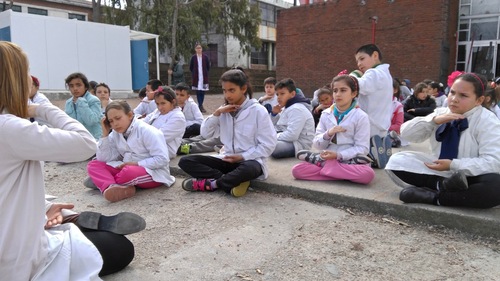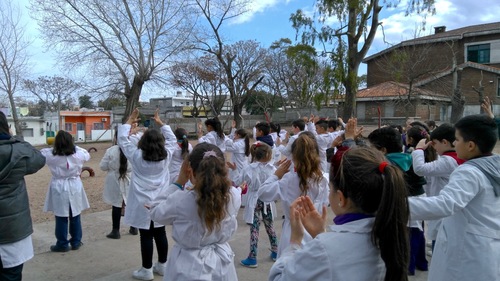If you’ve ever stepped into a rowdy classroom, you’ve most likely come across students chatting, yawning, and even raising voices.
It may seem the rambunctious students are banding together to push you over the edge.

What should teachers do to deal with rowdiness in the classroom?
To silence the noisy students, most teachers will employ methods, such as ringing a call bell, or raising their voice, saying “Attention, class.”
One state school in Montevideo, Uruguay, which had been facing discipline challenges with its students, however, utilized an orthodox approach, and it’s working!

In March 2016, the school initiated a project with the aim to create a calmer atmosphere in the classroom, preventing violence, and improving school performance.
The project required each teacher to conduct something that would help build a culture of peaceful coexistence in each classroom.
Sixth-grade teacher, Yennyfer Quartino, decided to introduce Falun Gong, also known as Falun Dafa—an ancient mind-body cultivation practice that has greatly improved her own physical and mental health—to her students, aged between 11 and 14 years old.

Quartino and her students began practicing Falun Dafa’s slow-moving exercises and sitting meditation daily in the school courtyard after lunch and before the afternoon classes.
Amazingly, a few weeks later, all the other students in the school joined in to learn the practice too.
Eventually, almost the whole school performs the Falun Dafa exercises daily.
As time went by, the seeds of Truthfulness, Compassion and Forbearance—Falun Dafa’s principles—gradually grew in these students’ hearts and changed them fundamentally.

The students—who used to have discipline problems, such as violence, fatigue, lack of concentration, and poor academic performance—have become more focused and tranquil in class.
“The school day is long,” Quartino told Minghui.org. “Many students were tired, had no energy, and couldn’t focus on their classwork.”
“The results have been wonderful,” she added.

The headmistress noticed the students’ improvement as well. She said, “They benefited not only physically, but spiritually. They breathe and relax and come to the classroom focused and with a good attitude.”
“These kids had serious concentration problems and were violent in the classroom. The changes they’ve made are soul-stirring,” the school inspector enthused.

And the students like the practice too.
Josefina, a sixth-grade student, said, “I feel relaxed, I like it. And afterward, when we go to the classroom, I feel as if all the stress I had before practicing Falun Dafa is gone.”
“I feel more relaxed and free,” said a third-grade girl.
A fourth-grade boy chimed in, “I feel a lot of energy.”
“Strength!” said third-grade students, Nicole and Belén, in unison.

The key to discipline a child is to teach him how to control his own behavior so that you don’t have to.
Hence, after practicing Falun Dafa, the students were able to take its principles of Truthfulness, Compassion and Forbearance to guide themselves in daily life. By looking within and steadily improve themselves to become a good person, the children have experienced peace, self-control, and this, in turn, helped foster a healthy, kind, and tolerant learning environment.
“Before, everyone was bad tempered, but now we are calmer,” said Joaquín, a sixth-grader.
Student Leandro added, “If he misbehaves, I must tolerate it.”
Editor’s Note: Dear readers, do you know that Falun Dafa, originally from China, is currently practiced by people in over 100 countries? But in China, since Jul. 20, 1999, Falun Gong is defamed, slandered and persecuted due to Chinese Communist Party’s fear of Falun Gong’s rapidly growing popularity. To learn more about the persecution Falun Gong practitioners are subject to in China, visit http://faluninfo.net/.
For more information about the practice or to download Zhuan Falun, visit: www.falundafa.org. All books, exercise music, resources, and instructions are available completely free of charge.

